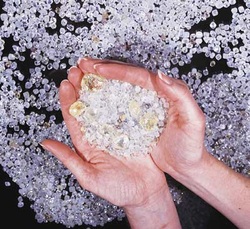Goal 2: Minerals and Substances of Earth
Rocks and Minerals

Minerals are inorganic; they are not alive. An example of a rock that is not a mineral is coal. Coal is a substance formed from decayed or decaying plants and animals. Therefore, coal is not considered a mineral. Minerals are found in dirt, rocks, and other places. Minerals are not made by man. They are made in nature by the actions nature takes to replenish it's minerals. Minerals are chemical substances. Gold and silver are two prime examples of elements that are made up of only one substance.
Minerals always have the same chemical makeup. For example, quartz will always consist of one part silicon which is an element two parts oxygen which is another element. Gold for example is one of the softest minerals. It can be easily worked or molded into any shape or form. Which is why there is so much jewelry made of gold.
Igneous rocks for example are made of minerals from inside volcanoes. Igneous (which is the Latin word for "fire") forms when lava or molten rock flows from the opening of a volcano and cools off, turning into a smooth rock like substance, with many gas pockets that can be seen. These former gas pockets were filled with gases while the liquid was cooling and made tiny bubbles. Minerals come in many shapes, colors, and textures. Sometimes you can tell what certain minerals are by how they look. Like Salt. you can tell what it is because it is white and grainy, much like the table salt we use only not as finely grounded. Also those clear, white, or sometimes purple crystals that you can sometimes find at museums, are minerals. They have been cut, yes, but they were growing a certain way before that gave them the shape and color that you see when you purchase them. Most of the time when you buy them they have some flat faces on them. That is because they were growing a certain way when they were mined, and then cut. Sometimes, the crystals can be found at very deep depths under the ground, and in very intense heating conditions, that could possibly have the potential to kill humans or any other creatures if they were to stay down under ground in the toxic gases that far below ground for more than five or six minutes at a time.
Minerals always have the same chemical makeup. For example, quartz will always consist of one part silicon which is an element two parts oxygen which is another element. Gold for example is one of the softest minerals. It can be easily worked or molded into any shape or form. Which is why there is so much jewelry made of gold.
Igneous rocks for example are made of minerals from inside volcanoes. Igneous (which is the Latin word for "fire") forms when lava or molten rock flows from the opening of a volcano and cools off, turning into a smooth rock like substance, with many gas pockets that can be seen. These former gas pockets were filled with gases while the liquid was cooling and made tiny bubbles. Minerals come in many shapes, colors, and textures. Sometimes you can tell what certain minerals are by how they look. Like Salt. you can tell what it is because it is white and grainy, much like the table salt we use only not as finely grounded. Also those clear, white, or sometimes purple crystals that you can sometimes find at museums, are minerals. They have been cut, yes, but they were growing a certain way before that gave them the shape and color that you see when you purchase them. Most of the time when you buy them they have some flat faces on them. That is because they were growing a certain way when they were mined, and then cut. Sometimes, the crystals can be found at very deep depths under the ground, and in very intense heating conditions, that could possibly have the potential to kill humans or any other creatures if they were to stay down under ground in the toxic gases that far below ground for more than five or six minutes at a time.
